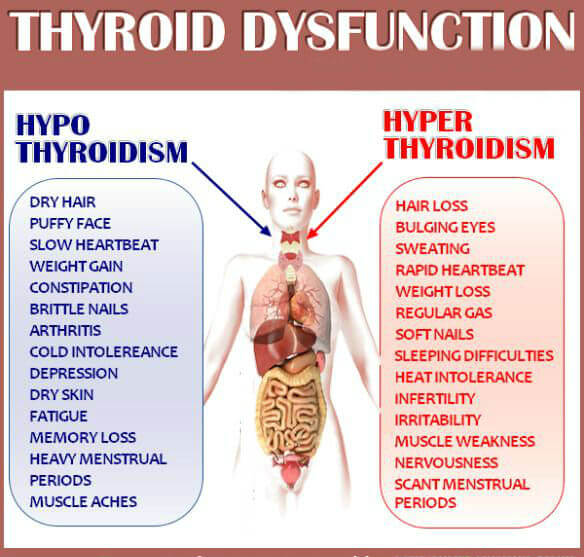Do you have brain fog and fatigue? Are you sweaty and anxious?
Over 30 million American’s have thyroid disorders, yet more than half remain undiagnosed and untreated. Many experience symptoms, but dismiss them as coming from other causes.
According to The American Association of Clinical Endocrinologists (AACE), thyroid disease is more common than diabetes and heart disease, or breast cancer. In fact, more than all types of cancer combined.

What is the thyroid gland?
The American Thyroid Association explains the thyroid gland as a butterfly-shaped gland located in the lower portion of the neck. The thyroid makes hormones that are carried through the blood to every tissue in the body. The thyroid affects vital tasks such as regulating body temperature, brain, muscle, and other organ functions.
What goes wrong?
Thyroid problems range in severity from a harmless goiter to advanced cancer (though rare). The two main conditions are hypothyroidism and hyperthyroidism.
Thyroid disorders are more prevalent in women and those with a family history of thyroid dysfunction. The metabolism is affected by either too much or too little hormone being released by the thyroid gland. The hormones produced by the thyroid affect almost every metabolic process in our body.
Hypothyroidism - When one has too little thyroid hormone in their blood, it is referred to as hypothyroidism. This occurs by the thyroid gland being underactive or by not producing enough thyroid hormone.
Here are some of the main symptoms of an underactive thyroid:
- Weight gain
- Always cold
- Tired
- Hair loss
- Brittle nails
- Constipation
- Fatigue
Causes:
- One of the most common causes is the immune system. The immune system’s job is to protect the body from invaders and infections. In the case of Hashimoto’s Disease, the thyroid gland cells and their enzymes will be mistaken as invaders and attacked. With many cells destroyed, there are not enough cells producing thyroid hormones.
- Another cause is thyroiditis or inflammation of the thyroid gland.
- Iodine levels can also cause this condition. In this country, we generally get plenty of iodine in our diets, but too little iodine can cause hypothyroidism, resulting in goiter (see below).
- Other causes can be surgical removal of the thyroid, radiation treatment, or some medicines.
Here is a representation of the difference in possible symptoms in women:

Hyperthyroidism - This occurs when one has too much thyroid hormone present in their blood. The thyroid is referred to as overactive.
As with hypothyroidism, your metabolism is affected; however, this time, one may initially feel like they have more energy. Eventually, this feeling can change to tiredness with hyperthyroidism as well. In most cases, symptoms come on slowly which makes them easily mistaken for stress symptoms:
- Fast heartbeat or racing feeling
- Easily perspire
- Hard time sleeping
- Restlessness
- Diarrhea
- Muscle weakness
- Trembling hands
- Losing weight despite a good appetite
- The eyes may look enlarged or may bulge
Causes:
- In 70% of cases, hyperthyroid is caused by overproduction of thyroid hormone by the thyroid gland due to an autoimmune disease known as Graves’ disease. Antibodies in the blood cause the thyroid to secrete too much thyroid hormone. This type of thyroid dysfunction runs in families and is more common with young women.
- A less common cause of hyperthyroidism is distinguished by one or more nodules or lumps in the thyroid. As these lumps grow, their output of thyroid hormone into the blood is greater than normal.
- The source of a third cause is when a problem with the immune system or a viral infection causes a leak of stored thyroid hormone temporarily causing hyperthroidism.
- Another temporary cause of hyperthyroidism is over consumption of thyroid hormone in pill form.
Additional Thyroid Concerns
Goiter - A goiter is an enlarged thyroid gland.
Causes:
- Iodine deficiency is the greatest cause of a goiter in other countries; however, it is uncommon in the United States and other developed countries.
- Hashimoto’s thyroiditis is where one’s own immune system attacks the thyroid gland. As this happens, the pituitary gland tries to offset the low thyroid hormone level and secretes more thyroid stimulating hormone (TSH). This stimulation causes the thyroid to grow, which may cause a goiter.
- Another cause is Graves’ disease in which the body’s immune system produces a protein called TSI (thyroid stimulating immunoglobulin) which stimulates the thyroid gland to enlarge and produce a goiter.
- Nodules within the thyroid gland can also cause a goiter.
Get step-by-step intructions on how to check your neck for a goiter.
A doctor can perform a physical examination when an enlargement has been found. Next, you will likely have a blood test to determine thyroid hormone levels and ultimately the cause of your goiter. Additional tests may be taken if the doctor feels it’s necessary to research the cause further.
Thyroid Cancer - Thyroid cancers are rare. Past radiation treatments to the head or neck have been shown to increase risk of nodules becoming cancerous later in life. Most thyroid cancers do not spread beyond the neck and respond well to treatment.
What to do
The treatment options will be different depending on the thyroid condition you have. Things to discuss with your doctor to determine the best course of action might be:
- Hypothyroidism is most commonly treated by supplementing the amount of hormone your body makes with a pill form of that hormone. There are both synthetic and natural options.
- Hyperthyroidism has many more choices of treatment which are often decided on by age, the severity of the condition, and other medical concerns.
- Because thyroid disease is autoimmune in nature, a nutrient-dense dietary approach could improve overall health and thyroid function. This dietary approach can reduce inflammation, promote the removal of toxins, and improve gut health.
Thyroid and pregnancy
The thyroid may encounter changes in hormones and size during pregnancy. These relatively minor changes are completely normal.
However, pregnancy impacts treatment and dosing for hypothyroidism, and it is important to follow up with your doctor to monitor your condition.
Looking for more details on how the thyroid works? Click this link for a more detailed description and diagram. https://www.ncbi.nlm.nih.gov/pubmedhealth/PMH0072572/
Thanks to the American Thyroid Association for supplying most of the research provided in this post.





